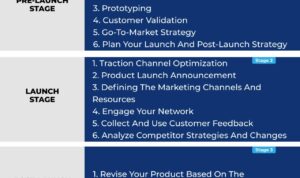Branding for Startups takes center stage, inviting readers into the dynamic world of creating a strong brand presence in a competitive market. With examples of successful startups and key branding strategies, this topic is all about making a lasting impression.
From building a brand identity to innovative brand awareness campaigns, this discussion will delve into the essentials of branding for startups.
Importance of Branding for Startups
Branding is a crucial aspect for startups as it helps them differentiate themselves in a competitive market, establish credibility, and build a loyal customer base. A strong brand identity can make a startup memorable and create a lasting impression on consumers, ultimately leading to increased visibility and sales.
Examples of Successful Startups with Effective Branding
- 1. Warby Parker: This eyewear company disrupted the industry with its affordable, stylish glasses and a strong emphasis on social responsibility. Their branding focused on offering high-quality products at a fraction of the cost of traditional retailers.
- 2. Airbnb: By creating a unique and memorable brand experience, Airbnb revolutionized the way people travel and find accommodation. Their branding emphasized the idea of belonging anywhere in the world, appealing to a wide range of travelers.
- 3. Dollar Shave Club: This subscription-based razor company gained popularity through its humorous and relatable branding. They positioned themselves as a disruptor in the shaving industry, offering high-quality products at affordable prices.
How Branding Helps in Creating a Unique Identity and Attracting Customers
Creating a strong brand identity allows startups to establish a unique voice, personality, and values that resonate with their target audience. By effectively communicating their brand message through consistent visuals, messaging, and customer interactions, startups can attract and retain customers who align with their values and mission. This emotional connection can lead to long-term customer loyalty and advocacy, ultimately driving business growth.
Elements of a Strong Brand Identity

Building a strong brand identity is crucial for startups to stand out in a crowded market and connect with their target audience. Key elements to consider include a compelling logo, a cohesive color palette, a distinct brand voice, and a consistent messaging strategy.
Logo
A logo is often the first visual representation of a brand that customers encounter. It should be memorable, simple, and reflective of the startup’s values and personality. A well-designed logo can help create instant brand recognition and differentiate the startup from competitors.
Color Palette, Branding for Startups
Colors play a significant role in brand identity as they evoke emotions and perceptions. Startups should choose a color palette that aligns with their brand positioning and resonates with their target audience. Consistency in using these colors across all brand assets can strengthen brand recognition.
Brand Voice
The brand voice represents the personality and tone of the startup in its communication with customers. Whether it’s casual and friendly or professional and authoritative, maintaining a consistent brand voice helps build trust and authenticity with the audience.
Messaging
Clear and compelling messaging is essential for startups to communicate their value proposition and connect with customers. Consistency in messaging across all channels and touchpoints reinforces the brand identity and builds brand loyalty over time.
By focusing on these key elements and ensuring consistency across all brand elements, startups can create a strong brand identity that resonates with their target audience, fosters brand recognition, and drives long-term brand loyalty.
Branding Strategies for Startups

Branding is crucial for startups to stand out in a competitive market and attract customers. Here are some effective branding strategies that startups can implement to establish a strong brand presence.
Traditional vs. Digital Branding Strategies
When it comes to branding, startups can choose between traditional methods like print advertising, direct mail, and networking events, or opt for modern digital strategies such as social media marketing, influencer collaborations, and . While traditional branding methods offer a personal touch and can be effective for local targeting, digital branding allows startups to reach a wider audience and engage with customers in real-time.
Tips for Differentiation in a Crowded Marketplace
1. Define Your Unique Value Proposition: Clearly communicate what sets your startup apart from competitors.
2. Tell Your Story: Develop a compelling brand narrative that resonates with your target audience.
3. Consistent Branding: Ensure consistency in your brand messaging, visuals, and customer experience across all touchpoints.
4. Focus on Customer Experience: Prioritize delivering exceptional customer service to build brand loyalty.
5. Embrace Innovation: Stay ahead of the curve by adopting new technologies and trends in branding.
Building Brand Awareness
Building brand awareness is crucial for startups to establish their presence in the market and attract customers. By utilizing various tactics, startups can effectively increase their brand visibility among their target audience.
Role of Social Media
- Leveraging popular social media platforms like Instagram, Facebook, Twitter, and LinkedIn to engage with customers and showcase products/services.
- Creating shareable content that resonates with the target audience and encourages viral sharing to reach a wider demographic.
- Utilizing paid advertising on social media to target specific demographics and increase brand visibility.
Influencer Partnerships
- Collaborating with influencers in the industry to promote products/services and reach a larger audience through their established following.
- Choosing influencers whose values align with the brand to ensure authenticity and credibility in the partnership.
- Running influencer marketing campaigns that showcase the startup’s offerings in a relatable and engaging manner.
Content Marketing
- Creating high-quality and valuable content such as blog posts, videos, infographics, and podcasts to educate and entertain the target audience.
- Optimizing content for search engines to improve visibility and attract organic traffic to the startup’s website.
- Engaging with online communities and forums to share expertise and establish the startup as a thought leader in the industry.
Innovative Brand Awareness Campaigns
- Dollar Shave Club’s viral video campaign that humorously showcased the brand’s value proposition and disrupted the traditional razor industry.
- Airbnb’s “Live There” campaign that focused on local experiences to differentiate the brand and connect with travelers on a personal level.
- Casper’s nap pods in busy cities that allowed people to try their mattresses and generated buzz through word-of-mouth marketing.












